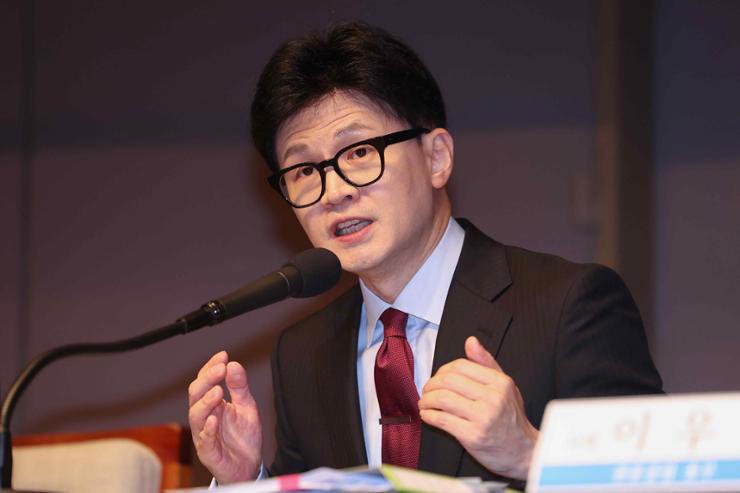The interim chief of South Korea’s ruling People Power Party, Han Dong-hoon, has compared the main opposition party to North Korea over a recent election rule decision.
The decision in question was made by the National Election Commission, which ruled that candidates who have been convicted of crimes related to national security or election law violations would be disqualified from running in the upcoming presidential election.
Han criticized the decision, saying that it was reminiscent of North Korea’s political system, where the ruling party controls the election process and disqualifies opposition candidates.
Han criticized the decision-making process for election rules, calling it a “comedy” that one person could decide critical regulations just two months before the general elections on April 10. His remarks followed Lee’s announcement that the Democratic Party of Korea (DPK) would stick to the current system, a decision granted by the party’s Supreme Council.
The law, introduced in 2019 to address overrepresentation issues, lost effectiveness as major parties exploited partner parties to circumvent its intent of supporting minor parties. Amid mounting criticism of the law’s flaws, the People Power Party (PPP) advocated for revisions before the elections, while the DPK, with a National Assembly majority, remained undecided.
Han pointed out the irony of Lee’s decision being unanimously approved, quipping, “A few months ago, North Korea got a 99 percent approval rate. But here we have 100 percent. Is this North Korea?” This comparison was drawn to North Korea’s local elections held in November 2023.
In another spotlight, Han’s disagreement with President Yoon Suk Yeol gained media attention, particularly regarding first lady Kim Keon Hee allegedly receiving a Dior handbag from a pastor in September 2022.
When questioned about this issue, Han reiterated his previous stance, emphasizing its significance as “a matter of public concern.” However, he characterized the scandal as “essentially a spy cam ploy.”
The controversy surfaced in November last year after a YouTube-based liberal news channel reported that the first lady received the luxury handbag from the pastor, who clandestinely filmed the scene using a camera watch device.
He further emphasized his trust in the president, highlighting their longstanding positive relationship as former senior and junior prosecutors. Han attributed this to mutual respect for each other’s lifestyle and work ethics.
“We operate within constitutional and legal boundaries, serving the people,” Han clarified. “There’s a misconception. I’m not advocating for the PPP solely for Yoon’s policies. Our government is led not just by one person but also by our party, Cabinet members, and supporters.”
Han stated that if the PPP triumphs, he would continue leading to reform the party. Conversely, if the party falls short of its electoral objectives, he would step down.
When questioned about his presidential aspirations, Han remained evasive. “I’m not contemplating life post-April 10,” he remarked, believing his future would be altered regardless of election outcomes.
Accepting the interim chief role in the PPP, Han expressed dissatisfaction with the DPK’s governance, asserting his ability to offer a superior vision for the nation.
One of his visions involves reforming the Assembly. Han pledged to address public demands for reducing lawmakers’ numbers, cutting their perks, and salaries, citing strong poll support for such measures.
“This isn’t populism. If it were, I’d embrace it gladly,” he retorted to criticisms of his proposals being populist. “While we’re not the first to suggest this idea, we aim to be the first to implement it.”

